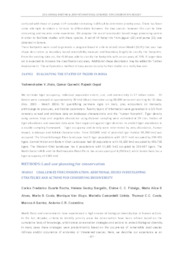Challenges for conservation: additional issues in developing strategies and actions for conserving biodiversity.
Challenges for conservation: additional issues in developing strategies and actions for conserving biodiversity.
Author(s): ROCHA, C. F. D.; BERGALLO, H. G.; FIDALGO, E. C. C.; ALVES, M. A. S.; COSTA, M. B.; VAN SLUYS, M.; UZEDA, M. C.; COSTA, T. C. e C. da; SANTOS, M. A.; COZZOLINO, A. C. R.
Summary: World Biota and environments have experienced a high erosion of biological diversity due to human actions. In the last decades, criteria to identify priority areas for conservation have been refined based on the cumulative body of knowledge, which drove conservation strategies and actions to protect biological diversity. In many cases these strategies were predominantly based on the occurrence of remarkable local species richness and/or occurrence of endemics or threatened species. Here, we describe our experience as an additional way of thinking conservation which focuses on the fact that regions of a political unit differ in socioeconomic and biological aspects, which in turn, should generate specific sets of conservation strategies. Our target was Rio de Janeiro State, Brazil (an area with high biological diversity under extreme human pressure). Our approach was based on how defining strategies and actions for conservation is a quite complex process which should involve a large set of aspects, that must be considered together, including biological, sociological, ecological, geomorphological, climatological, hydrological, economical and the actual landscape status among others. Along three years we gathered georeferenced data on all these aspects, complemented by biodiversity inventories in the field. The dataset were interrelated showing that the nine regions differed remarkably among them and, generated a different set of strategies to accommodate regional realities.
Publication year: 2009
Types of publication: Abstract in annals or event proceedings
Unit: Embrapa Soils
Keywords: Biodiversidade, Conservação
Observation
Some of Embrapa's publications are published as ePub files. To read them, use or download one of the following free software options to your computer or mobile device. Android: Google Play Books; IOS: iBooks; Windows and Linux: Calibre.
Access other publications
Access the Agricultural Research Database (BDPA) to consult Embrapa's full library collection and records.
Visit Embrapa Bookstore to purchase books and other publications sold by Embrapa.

